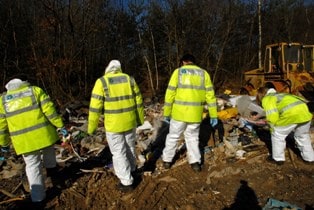A consultation on whether to bring illegal waste sites within the scope of landfill tax in England and Northern Ireland has been officially launched after being announced earlier this month as part of the Spring Budget.
The consultation, issued by HM Revenue & Customs yesterday (March 20), sets out the reasons for targeting illegal waste sites and considers how to define an illegal waste site, the persons liable for the tax and how to quantify the amount of tax due.
At present, waste which is landfilled by permitted companies is taxed by HMRC at £84.40 per tonne for standard rate material and £2.65 per tonne for less polluting material.
But, according to HMRC, potential revenue lost from material disposed of at illegal sites each year could be “significantly higher” than £150 million. And, it said it was keen to deter non-compliance with the law by making waste crime less profitable.
Illegal
Illegal waste sites are defined in the consultation as those which are operated in an organised manner and dispose of large volumes of waste in direct competition with the legitimate waste management industry. By the end of 2015/16, the consultation notes that there were 622 known illegal waste sites operating in England alone.
“This consultation focuses on removing the perverse advantage that controllers of these sites have over the legitimate waste management industry”, the document explains.
However, HMRC is keen to stress that it does not want to inadvertently bring sites which operate without a permit, for instance who operate under an exemption, into the scope of the tax or to damage legitimate business.
Material
HMRC proposes that all material disposed of at a site without a permit or licence or exemption should be ‘deemed’ to have been disposed of and therefore subject to a tax, regardless of whether the person making the deposit intended an alternative route for the material. It suggests that the standard (and higher) rate of tax should be applied to all material as it would be difficult to determine the material’s origin.
The consultation also proposes extending the liability to pay the tax beyond the controller of the site to a number of other people involved, for example a complicit landowner or waste transporter.
By bringing illegal sites into the scope of landfill tax, the consultation explains that illegal site operators would also be subject to the existing powers used by HMRC to penalise those who fail to register for and pay tax. This would be in addition to potential criminal sanctions brought by the Environment Agency.
The document says: “HMRC’s civil penalty regime provides a penalty of up to 100% of the text due plus interest. So, for example, if the Landfill Tax due was £500,000, a penalty of up to £500,000 could also be charged, plus interest.”
Stakeholders
Views are being sought from a wide range of stakeholders and in particular from those individuals and organisations that may be affected by illegal waste sites. This may include legitimate businesses who are undermined by illegal operations and councils and landowners who have to foot the cost of disposing of waste dumped on their land.
Earlier this month, the waste management company trade association, the ESA, welcomed the plans (see letsrecycle.com story).
The consultation runs for eight weeks and respondents have until May 5 to submit their views. The government said that if it pursued the policy, the earliest any changes would come into force is 1 April 2018.
The post Consultation opens on charging illegal sites landfill tax appeared first on letsrecycle.com.
Source: letsrecycle.com Waste Managment



